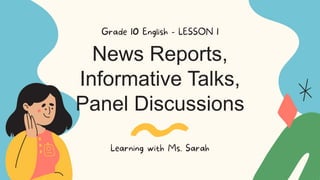English 10 - Lesson 1.pptx
An informative talk intends to educate an audience on a particular topic without swaying their views. There are different types of informative speeches like descriptive, demonstrative, explanatory, and definition. The main goal is to provide understanding of an unfamiliar topic. A panel discussion is a live discussion amongst experts with differing views on a topic in front of an audience. The purpose is for panelists to share knowledge and insights to benefit the audience. It is typically moderated and involves the panelists and audience questioning each other. News reports, informative talks, and panel discussions all aim to educate audiences but through different formats - news reports inform, talks provide understanding from one perspective, and panels showcase multiple expert viewpoints.

Recommended
Recommended
More Related Content
Similar to English 10 - Lesson 1.pptx
Similar to English 10 - Lesson 1.pptx (20)
More from RoyoMel
More from RoyoMel (20)
Recently uploaded
Recently uploaded (20)
English 10 - Lesson 1.pptx
- 1. News Reports, Informative Talks, Panel Discussions
- 5. ’
- 13. • An informative talk/speech intends to educate the audience on a particular topic. • There are many different types of informative speeches, including speeches that describe the conditions of a subject and speeches that instruct the audience on how to perform an action. • The main goal of an informative speech is to provide enlightenment regarding a specific topic the audience knows nothing about.
- 14. • The topics covered in an informative speech should help the audience to understand a subject better and to remember what they learned later. • The goal of this type of speech isn’t to sway the audience to the speaker’s point of view. Instead, the details need to be laid before the audience so that they can make an educated decision or learn about a subject they are interested in.
- 15. 1. A descriptive speech helps the speaker create an accurate mental picture in the mind of the audience regarding a specific person, place, or thing. 2. A demonstrative speech describes how to perform an action. 3. An explanatory speech explains the state of a topic. 4. A definition speech explains a concept or theory regarding a topic.
- 18. • A panel discussion is a specific format used in a meeting, conference, or convention. It is a live, in-person or virtual discussion about a specific topic amongst a selected group of experts who share differing perspectives in front of an audience. • The main purpose of a panel discussion is for the panelists to share their wisdom and provide insights to create real value and takeaways for the audience. It’s an “up close and personal” discussion amongst the panelists and with the audience.
- 19. •Typically facilitated by a skilled “panel moderator” who guides the panel and the audience through a lively conversation about a specific topic. •The panelists are a group of people typically 3-4 experts or practitioners in the field, who share facts, offer opinions, and responds to audience questions either through questions curated by the moderator or taken from the audience directly.
- 20. •The panel session typically lasts for 60-90 minutes. •It can be produced to be in front of a live audience or recorded for replay, shown in-person or remotely, with the moderator and panelists in one location or attending remotely, and with the audience in one physical room, or “virtually” (otherwise known as “geographically dispersed”).
- 21. • A set of presentations, one after another. The panel format allows for a brief introduction and then discussion among the panelists and audience. If the majority of the panel agenda is centred around presenting information, then just give each panelist a speaking slot with a Q&A after each speaker. • A one-on-one interview with each panelist. Many untrained moderators simply ask questions of each panelist, one after another, rather than build the dialogue into a conversation. Unless you create interplay among the panelists, create a format that includes an “up close and personal” interview with each speaker. • Just Q&A from the audience. When the focus is completely on answering the audience’s questions, you have a forum or “town hall” meeting.
- 23. ’